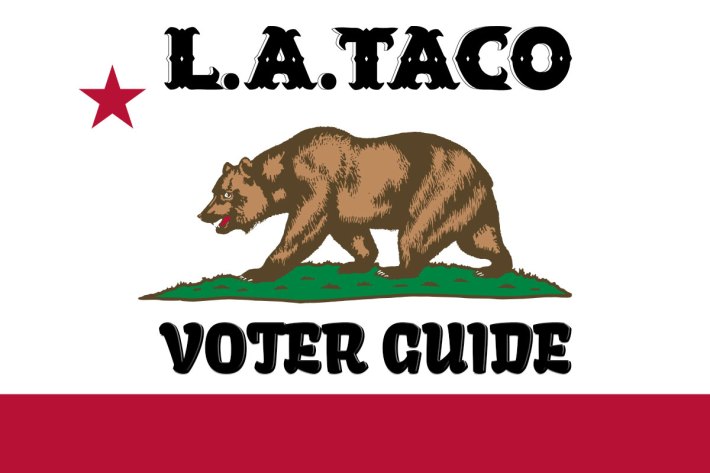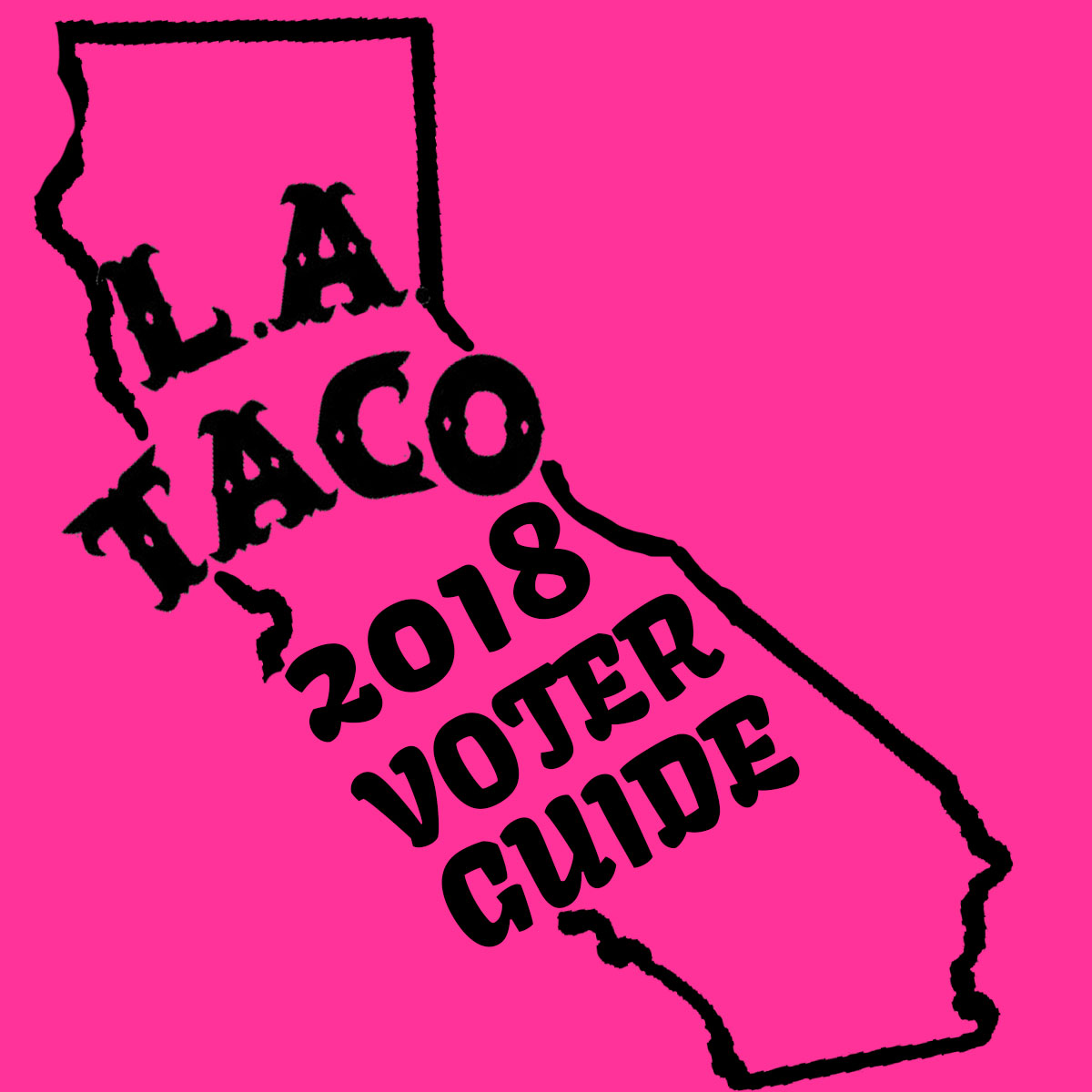Here’s Part 2 of our L.A. Taco Voter Guide, focusing on Proposition 6, a statewide measure that would recall a small gas on tax that funds road and infrastructure repairs.
[dropcap size=big]Y[/dropcap]ou can thank John Randolph Haynes for our wild proposition system. Haynes moved to Los Angeles from Philadelphia in the late 1800s, racked up a lot of money as a medical doctor, and with it, political influence. Haynes had an eccentric range of interests and ideas. He was an avowed socialist but also a supporter of eugenics, and a die-hard campaigner for direct democracy — a political ideal where people vote and draft legislation and policy themselves, not through elected representatives, aka politicians.
Haynes got the city of L.A. — and a year later in 1911 the state of California — to adopt direct democracy reforms, including allowing citizens to hold a recall vote to impeach elected politicians (Proposition 8 , 1911), and the statewide proposition system itself (Proposition 7, 1911), where citizens can write a proposed law, gather signatures from at least eight percent of Californians who voted in the last election, and put that proposition onto the ballot. Once voted into law by a majority of folks, such a proposition can’t be overturned by the state legislature, only by another citizen’s proposition or the California Supreme Court.
Just keep all this in mind, when you really stare down your ballot to make your choices, why year after year we vote on many serious but also silly and sometimes risky things — like repealing the so-called "gas tax" ... Here's Part 2 of our L.A. Taco voter guide, focusing on Proposition 6.

Prop 6 - “ELIMINATES CERTAIN ROAD REPAIR AND TRANSPORTATION FUNDING. REQUIRES CERTAIN FUEL TAXES AND VEHICLE FEES BE APPROVED BY THE ELECTORATE. INITIATIVE CONSTITUTIONAL AMENDMENT.”
[dropcap size=big]G[/dropcap]as is expensive, and it’s only seems to have gotten more expensive in California in the last decade. Charts showing the price of a gallon of gas by month across California since 2000 shows prices reaching an all-time high of $4.53 a gallon in June of 2008. Last month the price per gallon hovered around $3.55, which was slightly cheaper than the month before.
Gas prices fluctuate, it’s what they do. In 2014 the California Energy Commission tapped five economists to research why gas prices fluctuated, but stayed relatively high in California. The committee, called the Petroleum Market Advisory Committee, concluded that more studies had to be done, but that possibly California's high gas prices could be due to oil companies colluding to limit oil supplies, or costs of transportation and refinement of oil.

Prop. 6 and the loads and loads of special interest money being put behind it would like to convince you that gas prices are high because of the California Road Repair and Recovery Act of 2017, a bill passed by the state Legislature last year that put a tax on both gas and diesel purchases to pay for road and highway maintenance and some mass transit projects across the state.
The tax made gas about 12 cents more expensive per gallon, and diesel 20 cents more expensive per gallon. My car has about a 10-gallon tank, so my personal contribution to the state from this tax is $1.20 every time I fill up my tank. Prop 6 would repeal this tax and require the state legislature to put any future fuel or vehicle tax or fee on a ballot for voters to vote on.
The tax, which started taking effect in November of last year, is expected to bring in at least $2.9 billion in revenue for road maintenance across the state, roads and highways which one Caltrans spokesperson described as needing at least $6 billion a year to repair and maintain correctly.
But the "gas tax" proposition has still become a rallying cry for a so-far sputtering conservative revolt in California, which has the state's Republican minority actually arguing a kind of populist progressive more attuned to the Yes on 10 camp.
“California has become unaffordable for most people. The gas tax is just one more thing chipping away at the state’s unaffordability,” said Matt Fleming, the communications director for the California GOP, one of the biggest supporters of the bill.
It’s true that sales taxes, especially on essential goods like gasoline, are regressive, disproportionately hurting low income folks. One reason we have the highest state sales taxes in the country is because of our lack of revenue from property taxes because of Prop 13 (1978). The California GOP is hoping that voters think that the gas tax is a monstrous burden that they must reject.
By trying to generate enthusiasm for a gas-tax revolt, Republicans hope some votes could be skimmed over for the GOP's shaky slate in California's swing districts, and for the GOP candidate for governor, John Cox, who is all but certain to lose to Democrat Gavin Newsom.
TV ad put out by a PAC with ties to GOP House Speaker Paul Ryan. The ad connects Democratic candidate for CA-25 in Northern L.A. County Katie Hill, to her support of the gas tax as “radical.”
[dropcap size=big]B[/dropcap]ut the gas-tax line can yield results for conservatives. California’s 29th State Senate District lies straddling bits of L.A. County, a good part of Orange County, and a tiny bit of San Bernardino County. In 2016 Democrat Josh Newman eked out a victory in local elections to represent the district in the State Senate. Before Newman’s victory the district had voted mostly Republican in local, state, and presidential elections.
Last year Newman voted for the California Road Repair and Recovery Act, and almost immediately after a petition to recall him from the State Senate was drafted. Newman was recalled from office in June, the fifth state legislator to have ever been recalled since 1911.
The recall effort pushed the narrative that the gas tax was an unfair burden laid onto the middle class in California, and the narrative worked. It worked so much so that the initiative to put the repeal of the gas tax on the ballot this year received money from not only Cox but big name Republican party members from outside the state like Paul Ryan, the Republican Speaker of the House of Representatives — reminder, who is from Wisconsin.
The No on Prop 6 campaign has raised a surprising amount of money, nearly $29 million as compared to the Yes campaign's $3.6 million, with most of the money coming from trade and labor unions, and contractors, who will obviously benefit from the increase in funding for road improvements. The No campaign has a lot of money and a lot of support from officials like the California Democratic Party, Gov. Jerry Brown, and Mayor Eric Garcetti, a possible presidential candidate.
But despite the money and official support, the narrative of a burdensome tax on the middle and working class has the real potential of winning over the reality of the matter: a small tax that raises a lot of money to fix roads and highways, which everyone can agree is a good thing.
LA TACO VOTER GUIDE 2018:
Part 1~ Proposition 10 Clears Hurdle For Rent Control
Part 2 ~ Gas Tax Measure Proposition 6 Is All About Hopes of a Republican Revolt
Part 3 ~ Props 1 and 2 Are for Affordable Housing but Come at a Cost
Part 4 ~Measure B Could Eventually Keep Your Tax Dollars Out of Major Private Banks







